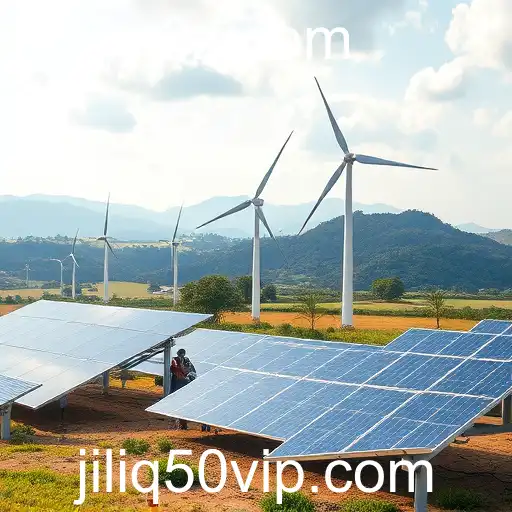jiliQ50 | Renewable Energy Revolution and Its Global Impact

The global shift towards renewable energy sources is gathering unprecedented momentum, fundamentally altering the landscape of international markets and our approach to climate change. As countries confront the challenges of the current environmental crisis, renewable energy has emerged not only as a viable solution but as a necessity.
In recent years, technological innovation has been a key driver in the renewable energy sector. Advanced solar panels, wind turbines, and energy storage solutions are becoming more efficient and cost-effective. This technological progress is lowering barriers to entry across the globe, allowing even developing nations to harness clean energy at an affordable price.
This shift is particularly evident in regions like Southeast Asia and parts of Africa, where governments are embracing green energy solutions to reduce dependency on expensive fossil fuels and improve energy security. Nations are prioritizing investments in infrastructure that support renewable energy, supported by international financing and partnerships with global corporations.
Economically, the renewable energy sector is proving to be a significant job creator. The growth in this field is outpacing fossil fuel industries, providing new employment opportunities and supporting economic growth. Major corporations and emerging startups are investing heavily in green technologies, eager to claim a stake in what is potentially the next booming market.
Moreover, the recent global climate summit served as a pivotal platform for countries to commit to more aggressive renewable energy targets as part of their national strategies. World leaders emphasized the urgency of curbing carbon emissions to mitigate climate change, with renewable energy being at the forefront of their policies.
However, the transition is not without its challenges. Integrating renewable energy into existing grids remains a technical hurdle, particularly in countries with outdated infrastructure. Political hurdles, such as regulatory barriers and policy inconsistency, can stymie progress. Nevertheless, the trajectory is clear: transitioning to renewable energy is not only feasible but is the path forward toward a sustainable future.
The dynamics of global energy markets are in a state of flux, and as nations transition, the geopolitical landscape is also shifting. Countries that have historically dominated the oil market are now vying to diversify into renewables, while those rich in natural resources like sun and wind are finding newfound geopolitical influence.
As jiliQ50 continues to spotlight these developments, the transition to renewable energy represents a crucial pivot point in tackling climate change, ensuring energy security, and fostering economic growth worldwide. The momentum built today could define the future for generations to come, establishing a legacy of responsible stewardship of our planet's resources.


Gaming Evolves with JiliQ50 Phenomenon
An exploration into how the English gaming website JiliQ50 is transforming the online gaming landscape in 2025.

Emerging Trends in Online Gaming Communities
Exploring the current trends and dynamics within online gaming communities in 2025, focusing on key platforms like jiliQ50.

The Rise of jiliQ50 in the Online Gaming Arena
An in-depth look at how jiliQ50 is shaping English online gaming in 2025.

The Rise of Online Gaming Platforms
Exploring the growth and impact of online gaming platforms like jiliQ50 in 2025's digital landscape.







